Leasing Vs. Buying
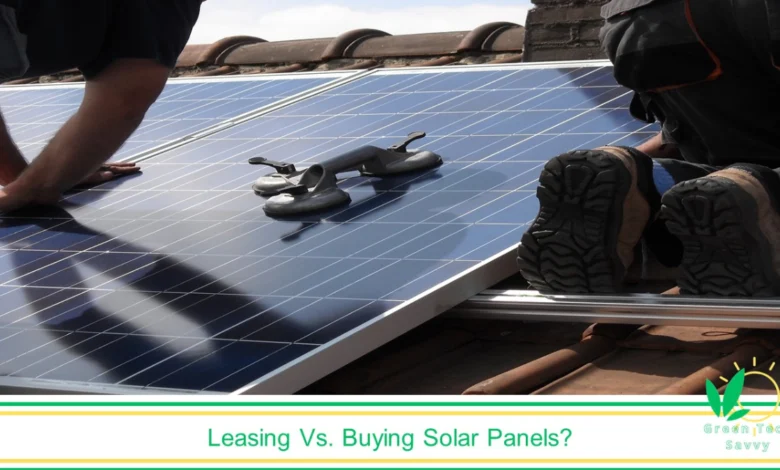
Lease or Buy Solar Panels: Differences, and the Better Choice
Solar panels buying refers to the process of acquiring photovoltaic or solar energy systems for the purpose of harnessing renewable solar energy. Buying solar panels involves selecting and purchasing solar panels, along with other necessary components, such as inverters, mounting structures, and electrical systems, to set up a solar power system for residential, commercial, or industrial use.
Solar panels leasing , on the other hand, is entering into an agreement where an individual or entity, commonly a homeowner or business, pays a regular fee to use solar panels installed on their property. Instead of outright purchasing the solar equipment, the user leases it from a solar provider. The leasing arrangement covers the installation, maintenance, and often the monitoring of the solar panels. While the lessee benefits from lower upfront costs and save on electricity bills, the ownership and responsibility for the solar panels remain with the leasing company for the duration of the lease agreement, which is typically a set number of years.
The 9 main differences between solar lease vs buy include (ownership, upfront costs, duration of commitment, transferability).
To make the right decision between lease or buy solar panels, consider 4 factors (budget, return on investment, the long term cost, home ownership). To make the right decision about buying a house with leased solar panels, consider mortgage conditions.
Monthly payments for solar lease exceed the total cost of solar purchase, in the long term. But solar leases are still worth it because they save money on electricity bills. Unlike buying solar panels, there are 6 advantages of leasing solar panels, including (cheap upfront costs, professional installation, and free maintenance). Unlike buying solar panels, there are 7 disadvantages, including (long-term costs, limited financial benefits, and difficult selling process of the property).
Solar leasing does not include any costs or payments for maintenance because the rental company is obligated to carry out periodic maintenance. In contrast, the solar system owner must afford the maintenance of the purchased solar panels.
This article answers the following questions: What is Leasing vs Buying Solar Panels? What are the Differences Between Renting Solar Panels and Purchasing Solar Panels? Is it Better to Lease or Buy Solar Panels? Should You Buy a House with Leased Solar Panels? How Much is a Solar Lease Per Month? Is Leasing Solar Panels Worth It? What are the Pros and Cons of Leasing Solar Panels? What is the Difference Between the Maintenance of Leased Panels and the Maintenance of Purchased Panels?
What is Solar Panels’ Leasing vs Buying?
Solar panels’ leasing involves renting the equipment and paying regular fees for its use, usually with lower upfront costs, while the ownership and maintenance responsibilities remain with the leasing company. On the other hand, solar panels entails purchasing the equipment outright, providing ownership and control over the system, but involves a higher initial investment. The decision between leasing and buying depends on individual preferences, financial considerations, and long-term goals regarding solar energy use.
The next part contains the differences between lease or buy solar panels to help make the right decision between both.
What are the Differences Between Solar Panels Leasing and Solar Panels Purchasing?
There are 9 differences between to rent solar panels or to purchase solar panels, the following picture shows them.
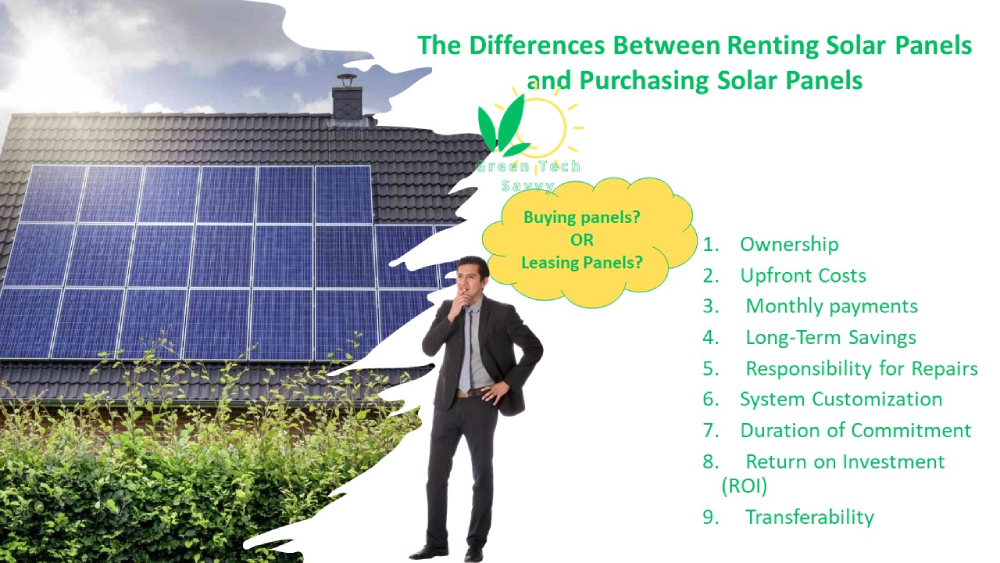
The 9 differences between to rent solar panels or to purchase solar panels are listed in the following list.
- Ownership. In solar lease houses, owners don’t own the solar panels; they are the property of the leasing company. While in solar buying property owners own the solar panels outright, providing control and responsibility.
- Upfront Costs. Solar panels leasing involves lower initial costs, making them more accessible for those with budget constraints. Solar panels buying, on the other hand, requires a higher upfront investment due to the cost of buying and installing the solar panels.
- Monthly payments. Renting panels involves ongoing monthly lease payments for the duration of the agreement. While buying panels once the system is paid off, there are no ongoing monthly payments for electricity generation.
- Long-Term Savings. Solar panel leasing makes immediate savings on electricity bills but are less cost-effective over the long term compared to ownership. While owning solar panels offers more significant long-term savings as you own the system and benefit from free electricity after the initial investment is recouped.
- Responsibility for Repairs. solar panel leasing companies cover maintenance and repairs during the lease period. While The panel’s owner is responsible for maintenance and repairs, they have more control over the quality of service.
- System Customisation. leased solar systems have limited ability to be customised, as the leasing company owns it. Purchased solar systems allow for customization and expansion according to specific energy needs and preferences.
- Duration of Commitment. Solar panels leasing involves a contractual commitment for a specified period, often ranging from 10 to 20 years. While solar panels purchasing, there is no contractual commitment beyond any financing agreements; you own the system for its entire lifespan.
- Return on Investment (ROI). renting solar panels provides immediate savings, but the long-term ROI is lower compared to ownership. While owning solar panels offers a higher long-term ROI as the system’s value exceeds the initial investment over time.
- Transferability. Leased solar panels are not easily transferable, potentially posing challenges if you sell your property. However, solar panel ownership enhance property value, and the system is able to transferred to new property owners.
Is it Better to Lease or Buy Solar Panels?
Solar panels leasing is better if you have low budget, and renting the home. To know whether it is better to buy or lease solar panels, consider 4 factors including (Budget, ROI, and home ownership). The following picture shows the 4 factors and circumstances to know whether it is better to buy or lease solar panels are.
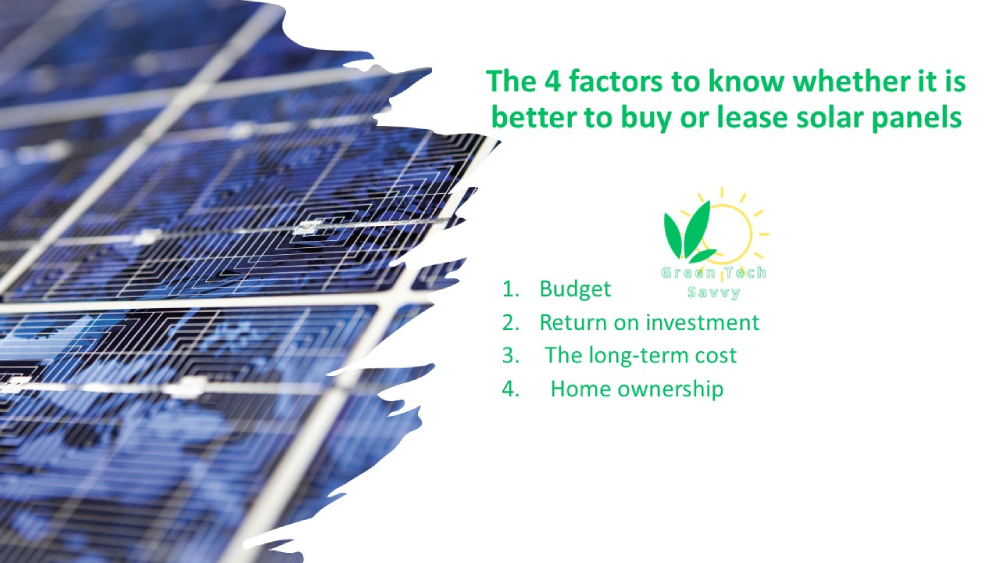
The 4 factors and circumstances to know whether it is better to buy or lease solar panels are listed in the following list.
- Budget. It is better to lease solar panels if the budget is limited. It is better to finance and purchase solar panels if the budget is good and the homeowner is able to obtain financing according to solar energy programs (rebates and incentives).
- Return on investment. Thinking about the return on investment in the solar system by saving electricity bills and selling surplus electricity (Net Metering), makes buying solar panels better than renting them.
- Cost on the long-term. Comparing the cost required during the life of the solar panels lease, with the cost of purchasing the solar panels is necessary before making a decision about lease vs finance solar panels.
- Home ownership. It is best to lease solar panels because of the difficulty of transporting them if you move out, if you are renting a home. On the other hand, if you own the property and are planning to sell it, the purchased solar panels increase the value of your house. If you find a buyer for the house, who appreciates the value of the solar system, its benefits and uses and wants to buy a house with solar panels.
Should You Buy a House with Leased Solar Panels?
No, because obtaining a mortgage is challenging if the solar panels are leased. Lenders are often hesitant to finance properties with leased rooftops. Mortgage lenders require full details of the installation and lease. If the solar panel company’s documentation deviates from official guidelines, securing a loan might be difficult. This situation also pose challenges when selling the property, as potential buyers encounter similar difficulties in obtaining a mortgage.
If you wonder if you should buy a house with purchased solar panels, it is crucial to inform your mortgage company about the presence of solar panels on the property. Typically, they request proof of accreditation from the installing company and approval from the local authorities for the panel placement. Additionally, your solicitor should confirm that the panels are removed without incurring penalties, significantly if they contribute to the power grid. Consider ongoing maintenance costs, as solar panels require replacement after 20-25 years, and ensure they are adequately insured.
How Much is a Solar Lease Per Month?
The monthly cost for a solar lease ranges from 50 dollars to 250 dollars. The monthly payment of leasing solar panels is influenced by factors such as the system’s size, the duration of the agreement, and geographical location.
The annual cost for a solar lease ranges from 600 dollars to 3000 dollars. The total cost for a solar panels lease during the panels’ lifespan ranges from 15000 dollars to 75000 dollars. Buying a solar system outright costs 15,000 dollars to 20,000 dollars after tax credits.
The cost is raised with the increase in the number of solar panels needed to power the homes. The cost decreases as the duration of the leasing agreement increases, which makes leasing solar panels worth it.
Is Leasing Solar Panels Worth It?
Yes, leasing solar panels is worth it when facing budget constraints and being unable to afford to buy panels upfront expense. Leasing solar panels is worth it if the monthly lease payment is lower than the savings on the power bill. Like buying solar panels, leasing solar panels saves money on energy bills to compensate for the initial investment, ultimately leading to overall financial gains.
What makes leasing solar panels more worth it is the savings in the maintenance expenses, which is one of the pros of leasing solar panels.
What are the Pros and Cons of Leasing Solar Panels?
There are 6 pros of solar panels leasing, unlike buying solar panels. The following picture shows the 6 pros of leasing solar panels.
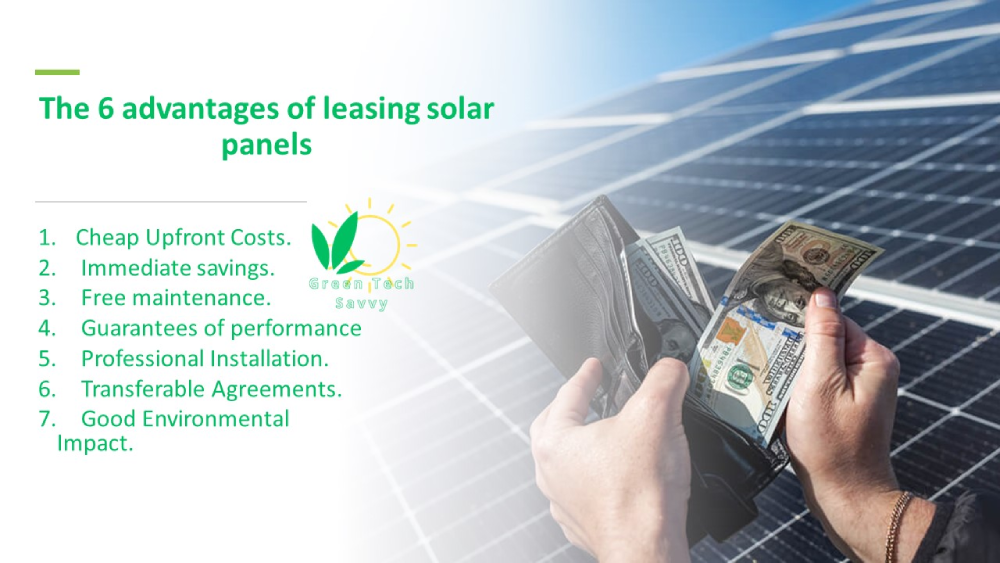
The 6 advantages of leasing solar panels are listed in the following list.
- Saved upfront costs.
- Immediate savings in electricity bills.
- Included maintenance in leasing agreements.
- Guarantees of performance by leasing companies.
- Professional installation buy leasing companies.
- Transferable agreements, where solar lease agreements are transferable to new homeowners, potentially enhancing the property’s value and marketability.
- Good environmental impact.
There are 7 cons of solar panels leasing, unlike buying solar panels. Even with those disadvantages, solar leases are not bad.
The following picture shows the 7 cons of solar panels leasing.
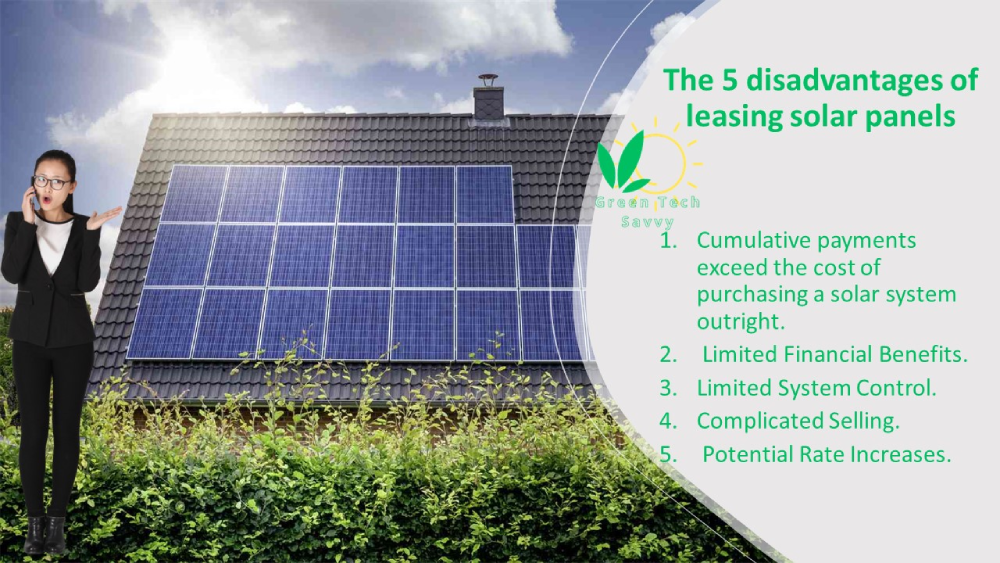
The 7 downsides of solar panels leasing are listed in the following list.
- Long-term costs. The cumulative payments exceed the cost of purchasing a solar system outright.
- Limited financial benefits. A significant portion of the financial benefits of solar energy go towards the lease rather than direct ownership.
- Complex lease terms and conditions.
- Limited system control.
- Complicated selling process of the property. A home with leased solar panels are challenging, as potential buyers are reluctant to assume the lease, complicating the sales process.
- Potential Rate Increases.This reduces the predictability of costs over the life of the lease.
What is the Differences Between the Maintenance of Leased Panels and the Maintenance of Purchased Panels?
Solar leasing does not include any costs or payments for maintenance because the rental company is obligated to carry out periodic maintenance. Likewise, the homeowner in solar leasing cannot attempt to maintain the panels himself without consulting the rental company.
As for the maintenance of the purchased solar panels, the solar system owner must afford it. Maintenance requires periodic costs for troubleshooting and cleaning. The owner of solar panels chooses between performing the maintenance himself; in this case, the owner has a lot to know about solar panels maintenance. Or they are calling solar maintenance services to carry out periodic maintenance.